|
|
|
Sort Order |
|
|
|
Items / Page
|
|
|
|
|
|
|
| Srl | Item |
| 1 |
ID:
118377


|
|
|
|
|
| Publication |
2013.
|
| Summary/Abstract |
This report explores Iranian popular opinion on the Treaty on the Non-Proliferation of Nuclear Weapons (NPT) and the determinants of Iranian attitudes. Using data from a 2008 survey of 710 Iranians administered by the University of Maryland's Program on International Policy Attitudes, we find that that a significant minority of Iranians (10 percent in 2006 and 14 percent in 2008) would prefer that Iran withdraw from the NPT. Our statistical analysis shows that Iranians who fear a US attack on Iranian nuclear facilities and distrust the International Atomic Energy Agency are more likely to want to quit the NPT. We therefore argue that those who do not trust other nations are most likely to oppose the NPT.
|
|
|
|
|
|
|
|
|
|
|
|
|
|
|
|
| 2 |
ID:
141295
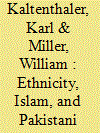

|
|
|
|
|
| Summary/Abstract |
This article argues that an Islamist militant group with a relatively homogenous ethnic make-up is more likely to be supported by those of the same ethnicity even if the group makes no reference to and even downplays the importance of ethnicity. Using survey data from an original survey carried out in Pakistan in 2013, with 7,656 respondents, this hypothesis is tested in a multiple regression analysis of support for the Pakistani Taliban. The results demonstrate that co-ethnicity between the respondent and the Islamist militant group is the most important predictor of support for the militant group.
|
|
|
|
|
|
|
|
|
|
|
|
|
|
|
|
| 3 |
ID:
164584
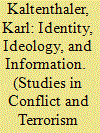

|
|
|
|
|
| Summary/Abstract |
This article explores the amount and sources of support for the Islamic State among Iraqis. We argue that, in addition to shared identity and ideology, a neglected factor in debates about support for Islamist militancy is the messaging and information that individuals receive about a given group. We test these arguments using regression analysis on public opinion data collected in Iraq in April 2015. The analyses largely support our contentions, showing that exposure to news coverage of the Islamic State in Iraq and the Levant substantially reduces support for the group, even among alienated Sunnis or ideological Islamists.
|
|
|
|
|
|
|
|
|
|
|
|
|
|
|
|
| 4 |
ID:
124252
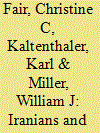

|
|
|
|
|
| Publication |
2013.
|
| Summary/Abstract |
A 2008 poll of Iranians revealed that approximately twenty-four percent of those surveyed support the development nuclear weapons by Iran, while seventy-four percent of those surveyed support the development of exclusively peaceful nuclear capabilities. This essay develops an argument that explains why Iranians hold different views on nuclear weapons. We contend that the elite discourse on the legitimacy of nuclear weapons within a nation will play a very large role in shaping public attitudes on the development of such weapons. In post-revolution Iran, ruling elites have invoked Islam to shape the discourse on nuclear weapons, and top clerics have argued that Islam forbids the development of such weapons. Thus we would expect that acceptance or rejection of this view of nuclear weapons will be the primary factor explaining an Iranian's support for or opposition to their development. Our regression analyses indicate that a respondent's views on whether Islam tolerates the development of nuclear weapons explain, in large measure, the observed variation in Iranian support for developing nuclear weapons.
|
|
|
|
|
|
|
|
|
|
|
|
|
|
|
|
| 5 |
ID:
116429


|
|
|
| 6 |
ID:
130957
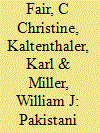

|
|
|
|
|
| Publication |
2014.
|
| Summary/Abstract |
America's Employment of Weaponized Unmanned Aerial Vehicles (Uavs), Popularly Known as "drones," to kill alleged terrorists in Pakistan's federally administered tribal areas (FATA) fuels sustained controversy in Pakistan. Pakistani outrage has steadily deepened since 2008, when the United States increased the frequency of the strikes.1 The increasing use of "signature strikes" has been particularly controversial in (and beyond) Pakistan, because such strikes are targeted at "men believed to be militants associated with terrorist groups, but whose identities aren't always known."2 Whereas personality strikes require the operator to develop a high level of certainty about the target's identity and location, based on multiple sources such as "imagery, cell phone intercepts and informants on the ground,"3 operators may "initiate a signature strike after observing certain patterns of behavior."4 When conducting signature strikes, the United States assesses that the individuals in question exhibit behaviors that match a pre-identified "signature" (for example, pattern of observable activities and/or personal networks) that suggests that they are associated with al Qaeda and/or the Pakistani or Afghan Taliban organizations.5 Because the identity of the target is unknown, even during the strike, it is possible that these persons are innocent civilians, a possibility that both current and former U.S. government officials concede.6 While the George W. Bush administration employed both personality strikes from 2004 and signature strikes from 2008 in Pakistan, the administration of Barack Obama has redoubled the use of both types.7 This has ignited public protests against the drones in Pakistan, particularly in Pakistan's urban areas-far removed from the tribal areas where drones are employed. It has also galvanized a vigorous debate within Pakistan's National Assembly, which tried, but ultimately failed, to curtail the strikes
|
|
|
|
|
|
|
|
|
|
|
|
|
|
|
|
| 7 |
ID:
141153
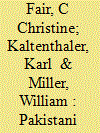

|
|
|
|
|
| Summary/Abstract |
Conventional wisdom holds that Pakistanis are overwhelmingly opposed to American drone strikes in their country’s tribal areas and that this opposition is driven by mass media coverage of the loss of life and property the strikes purportedly cause. Using an approach based in the literature in political communication and public opinion, we argue this conventional wisdom is largely inaccurate. Instead, we contend that awareness of drone strikes will be limited because Pakistan is a poor country with low educational attainment, high rates of illiteracy and persistent infrastructure problems that limit access to mass media. Moreover, because of these same country characteristics, Pakistanis’ beliefs about drone strikes will be shaped primarily by informal, face-to-face political communication, rather than through more formal media sources. We test this argument using data that we collected by fielding a 7,656 respondent, nationally-representative survey carried out in Pakistan in 2013. The results of the statistical analysis support our arguments.
|
|
|
|
|
|
|
|
|
|
|
|
|
|
|
|
| 8 |
ID:
072470
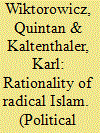

|
|
|
|
|
| Publication |
2006.
|
| Summary/Abstract |
QUINTAN WIKTOROWICZ and KARL KALTENTHALER focus on how spiritual incentives inspire Islamic radicalism. They argue that radical Islamic groups offer spiritual incentives and strategies for fulfilling divine duties and maximizing the prospect of salvation on judgment day. They conclude that the choice of individuals to move to high-cost and high-risk activism can be understood as a rational decision.
|
|
|
|
|
|
|
|
|
|
|
|
|
|
|
|
| 9 |
ID:
126577


|
|
|
|
|
| Publication |
2013.
|
| Summary/Abstract |
This study argues that a central factor in the determinants of citizen attitudes toward trade is the social psychology of the individual in question. Namely, we contend that the level of social trust an individual has will condition the degree to which an individual wants to open her country to imports from other countries. Those individuals with lower relative levels of social trust are less likely to support the notion of freer trade. We base this contention on the logic that those people who are distrustful of people in general are more likely to distrust that which comes from people who are unknown to them, such as goods coming into their country from abroad. This argument is a departure from previous studies of public attitudes toward trade, which have focused on various economic utilitarian considerations and xenophobia that shape citizen attitudes toward trade liberalization. To test our argument, we employ data from the 1995-1997 wave of the World Values Survey. Using a logit regression analysis, we find, as predicted, that the more social trust an individual has, the more likely that person is to support the idea of liberalized trade.
|
|
|
|
|
|
|
|
|
|
|
|
|
|
|
|
| 10 |
ID:
098886


|
|
|
|
|
| Publication |
2010.
|
| Summary/Abstract |
This study is interested in understanding public opinion in Pakistan toward terror attacks. Specifically, this study explores (1) the general picture of attitudes in Pakistan toward terrorism and (2) which individuals are most likely to support terrorism in Pakistan. The study aims to give insights into how pervasive a support base exists for terrorism as a tactic in Pakistan and it seeks to isolate the individual-level traits that account for the variation we see among Pakistani Muslims regarding their level of acceptance of terrorism against Pakistani and Indian targets. The study finds that a large majority of Pakistanis oppose terrorism but terrorism directed at Indian targets is more tolerated than terrorism against Pakistani targets. The study also finds that those who are most supportive of Talibanization in Pakistan are the most supportive of terrorism.
|
|
|
|
|
|
|
|
|
|
|
|
|
|
|
|
|
|
|
|
|